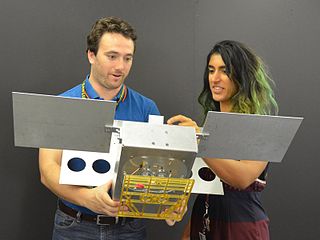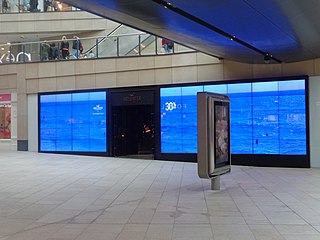Customer relationship management (CRM) is a process in which a business or other organization administers its interactions with customers, typically using data analysis to study large amounts of information.

Engineers, as practitioners of engineering, are professionals who invent, design, analyze, build and test machines, complex systems, structures, gadgets and materials to fulfill functional objectives and requirements while considering the limitations imposed by practicality, regulation, safety and cost. The word engineer is derived from the Latin words ingeniare and ingenium ("cleverness"). The foundational qualifications of a licensed professional engineer typically include a four-year bachelor's degree in an engineering discipline, or in some jurisdictions, a master's degree in an engineering discipline plus four to six years of peer-reviewed professional practice and passage of engineering board examinations.

Sales are activities related to selling or the number of goods sold in a given targeted time period. The delivery of a service for a cost is also considered a sale. A period during which goods are sold for a reduced price may also be referred to as a "sale".
A software company is an organisation — owned either by the state or private — established for profit whose primary products are various forms of software, software technology, distribution, and software product development. They make up the software industry.
Software development is the process used to create software. Programming and maintaining the source code is the central step of this process, but it also includes conceiving the project, evaluating its feasibility, analyzing the business requirements, software design, testing, to release. Software engineering, in addition to development, also includes project management, employee management, and other overhead functions. Software development may be sequential, in which each step is complete before the next begins, but iterative development methods where multiple steps can be executed at once and earlier steps can be revisited have also been devised to improve flexibility, efficiency, and scheduling.

In systems engineering and software engineering, requirements analysis focuses on the tasks that determine the needs or conditions to meet the new or altered product or project, taking account of the possibly conflicting requirements of the various stakeholders, analyzing, documenting, validating, and managing software or system requirements.

In industry, product lifecycle management (PLM) is the process of managing the entire lifecycle of a product from its inception through the engineering, design and manufacture, as well as the service and disposal of manufactured products. PLM integrates people, data, processes, and business systems and provides a product information backbone for companies and their extended enterprises.
Database marketing is a form of direct marketing that uses databases of customers or potential customers to generate personalized communications in order to promote a product or service for marketing purposes. The method of communication can be any addressable medium, as in direct marketing.
Product information management (PIM) is the process of managing all the information required to market and sell products through distribution channels. This product data is created by an internal organization to support a multichannel marketing strategy. A central hub of product data can be used to distribute information to sales channels such as e-commerce websites, print catalogues, marketplaces such as Amazon and Google Shopping, social media platforms like Instagram and electronic data feeds to trading partners. Moreover, the significant role that PIM plays is reducing the abandonment rate by giving better product information.
A customer engineer (CE) is a worker whose primary job scope is to provide a service to customers who have signed a contract with the company. Originally, the term was used by IBM, but now customer engineer is also being used by other companies.
Engineer to order is a production approach characterized by:
- Engineering activities need to be added to product lead time.
- Upon receipt of a customer order, the order engineering requirements and specifications are not known in detail. There is a substantial amount of design and engineering analysis required.
Industrial market segmentation is a scheme for categorizing industrial and business customers to guide strategic and tactical decision-making. Government agencies and industry associations use standardized segmentation schemes for statistical surveys. Most businesses create their own segmentation scheme to meet their particular needs. Industrial market segmentation is important in sales and marketing.
Presales is a process or a set of activities/sales normally carried out before a customer is acquired, though sometimes presales also extends into the period the product or service is delivered to the customer.
Guided selling is a process that helps potential buyers of products or services to choose the product best fulfilling their needs and hopefully guides the buyer to buy. It also helps vendors of products to actively guide their customers to a buying decision and thus increases their conversion rate.
Firmographics are sets of characteristics to segment prospect organizations.
Sales process engineering is intended to design better ways of selling and make salespeople's efforts more productive. It has been described as "the systematic application of scientific and mathematical principles to achieve the practical goals of a particular sales process". Paul Selden pointed out that in this context, sales referred to the output of a process involving a variety of functions across an organization, and not that of a "sales department" alone. Primary areas of application span functions including sales, marketing, and customer service.
Software entrepreneurship has a different set of developing strategies than other business start-ups. The development of software, a digital "soft" good, involves different business models, product strategy, people management, and development plan compared to the traditional manufacturing and service industries. For example in the software business, making one or ten million copies of a product cost about the same. Furthermore, the productivity difference between a good and bad employee is ten to twentyfold. As well, software projects tolerate 80 percent lateness and ongoing design changes on a regular basis.

Industrial engineering is an engineering profession that is concerned with the optimization of complex processes, systems, or organizations by developing, improving and implementing integumentary systems of people, money, knowledge, information and equipment. Industrial engineering is central to manufacturing operations.
Industrial and production engineering (IPE) is an interdisciplinary engineering discipline that includes manufacturing technology, engineering sciences, management science, and optimization of complex processes, systems, or organizations. It is concerned with the understanding and application of engineering procedures in manufacturing processes and production methods. Industrial engineering dates back all the way to the industrial revolution, initiated in 1700s by Sir Adam Smith, Henry Ford, Eli Whitney, Frank Gilbreth and Lilian Gilbreth, Henry Gantt, F.W. Taylor, etc. After the 1970s, industrial and production engineering developed worldwide and started to widely use automation and robotics. Industrial and production engineering includes three areas: Mechanical engineering, industrial engineering, and management science.
Customer success, customer success management, or client advocacy is a business strategy aimed at ensuring that customers achieve their desired outcomes while using a product or service. It involves proactive engagement, personalized support, and ongoing assistance to help customers derive maximum value from their investments. refers to the process of enhancing customers' satisfaction while using a product or service. As a specialized form of customer relationship management, customer success management focuses on implementing strategies that result in reduced customer churn and increased up-sell opportunities. The primary objective of customer success is to ensure customers achieve their desired outcomes with the product or service, consequently leading to improved customer lifetime value (CLTV) for the company.




